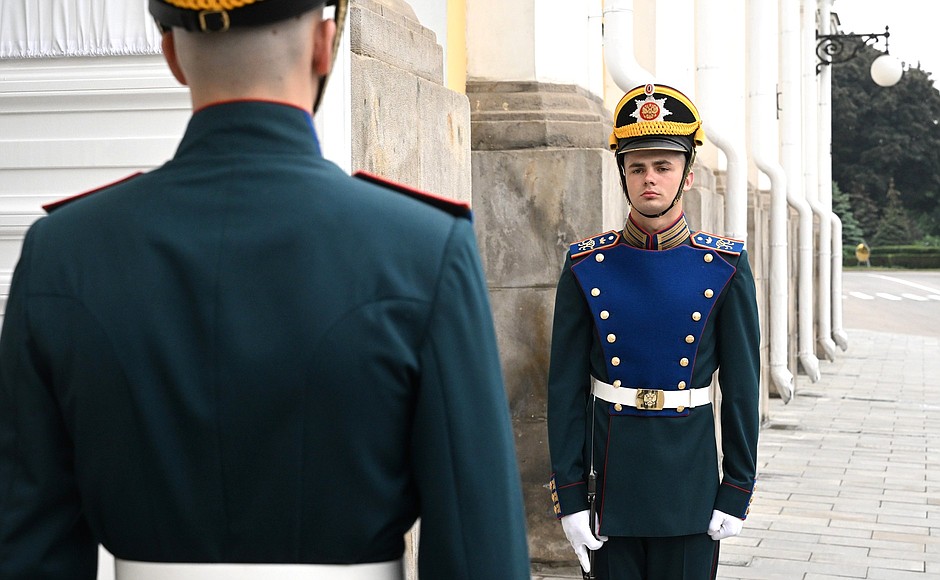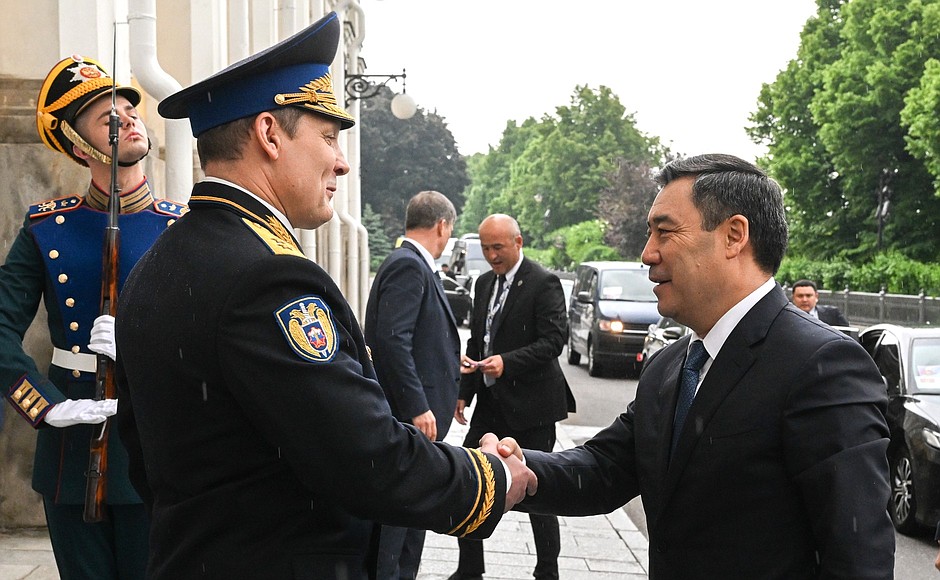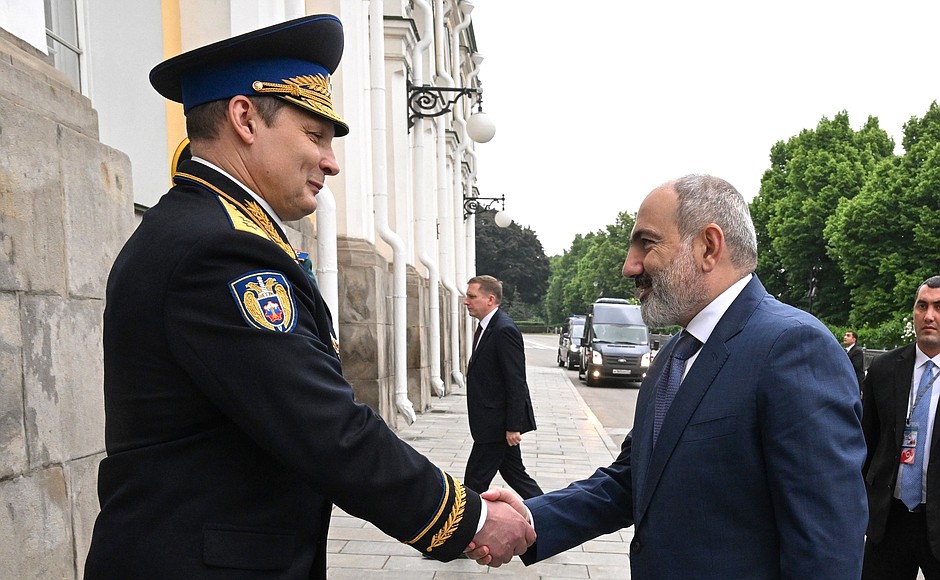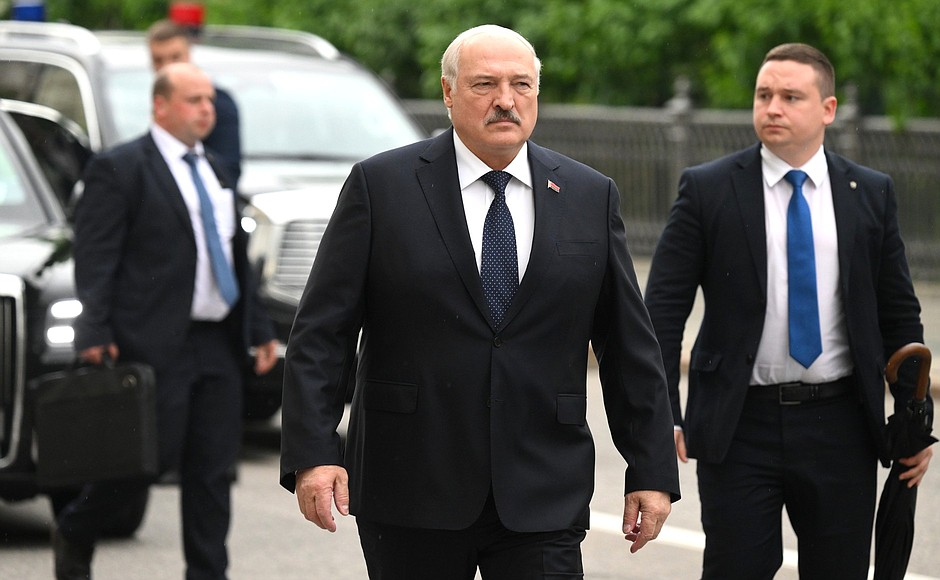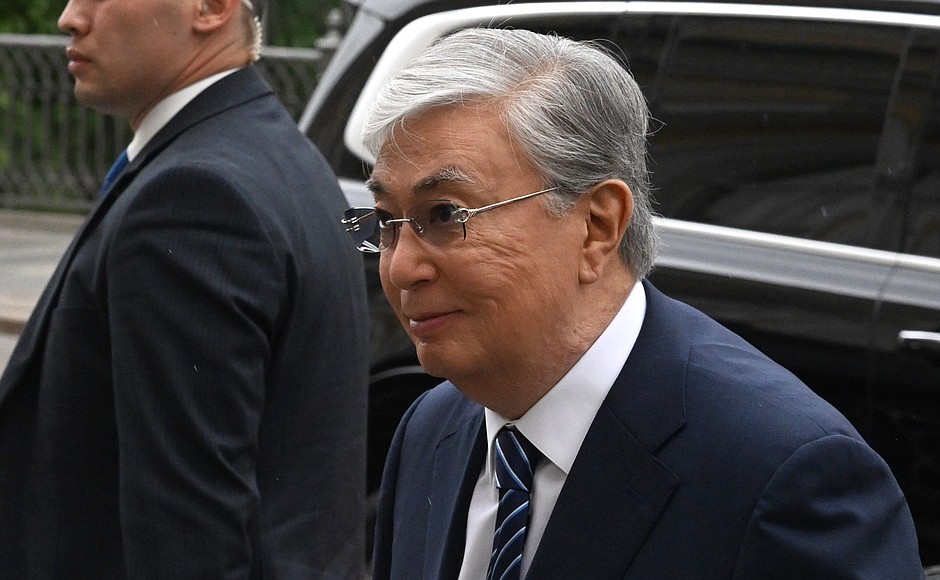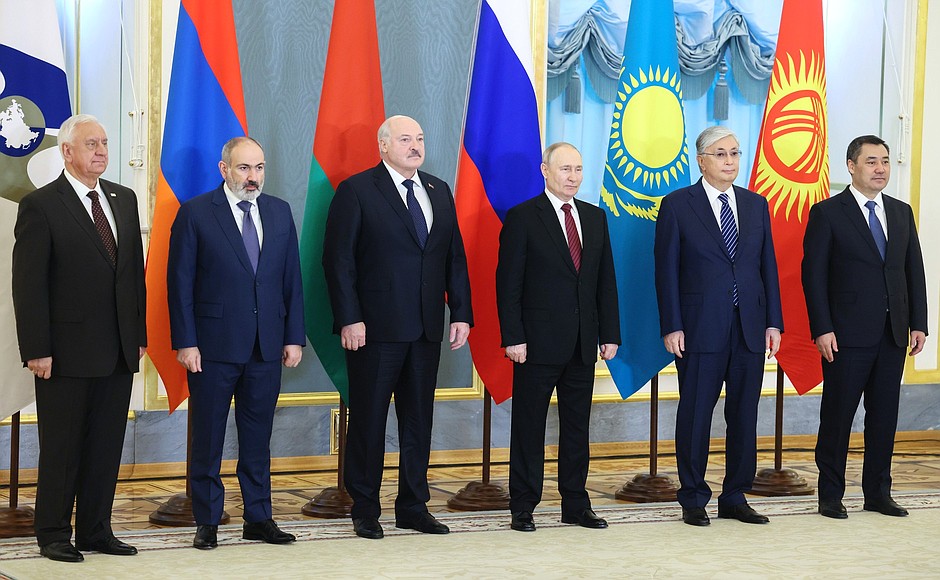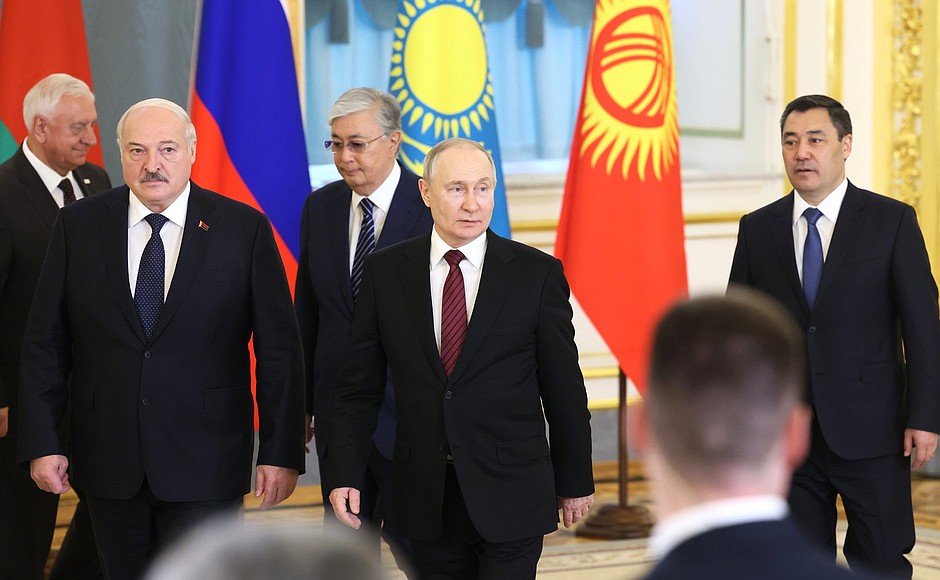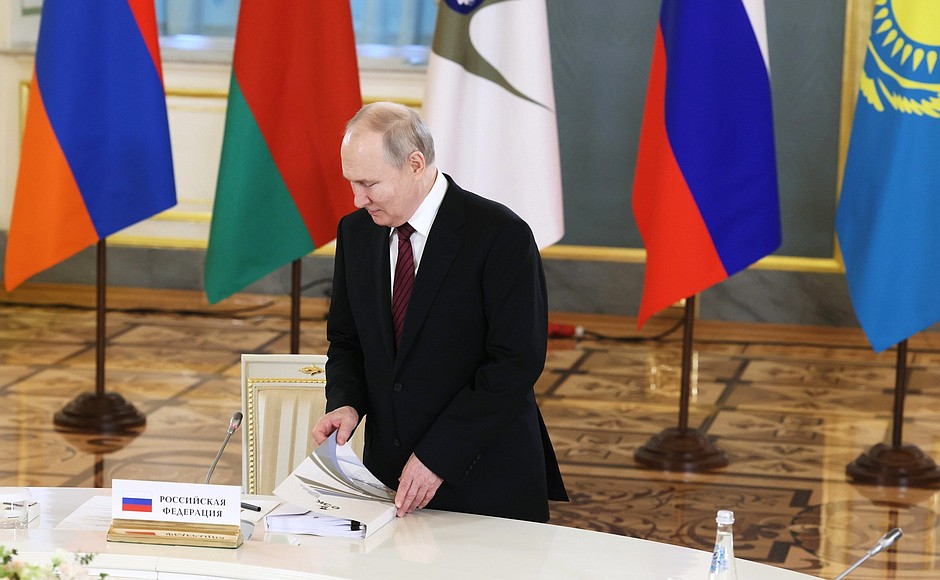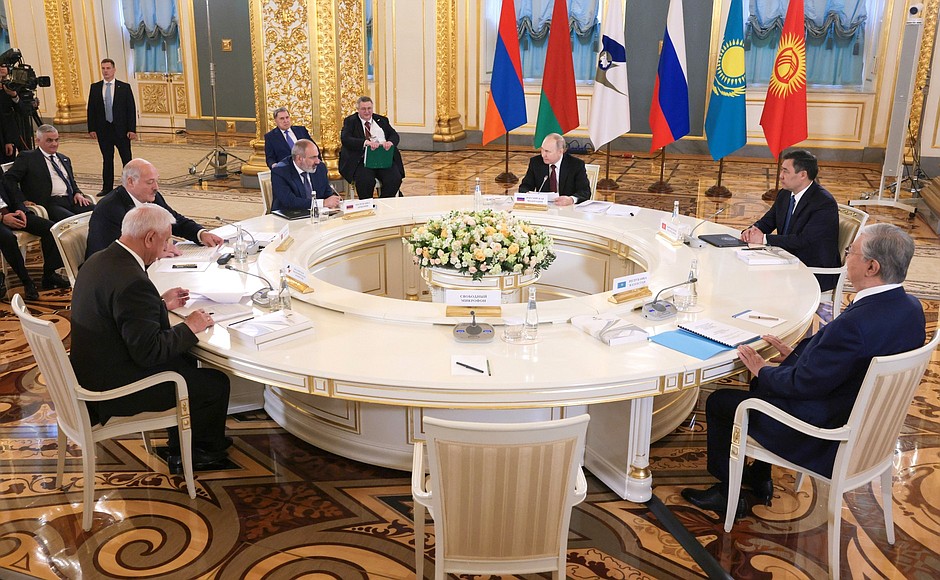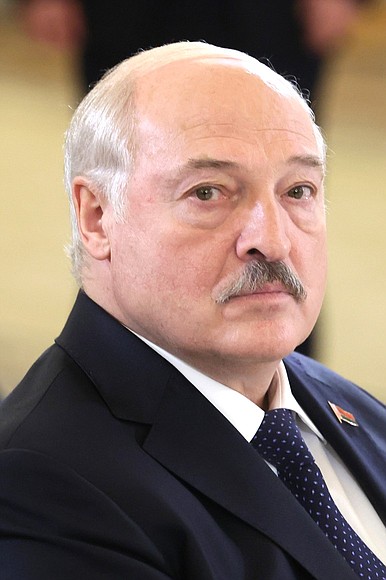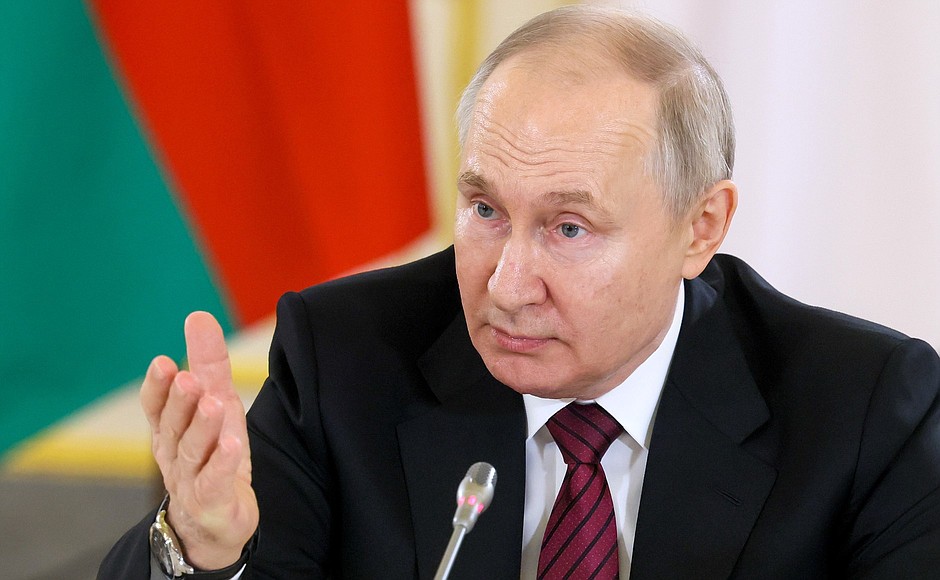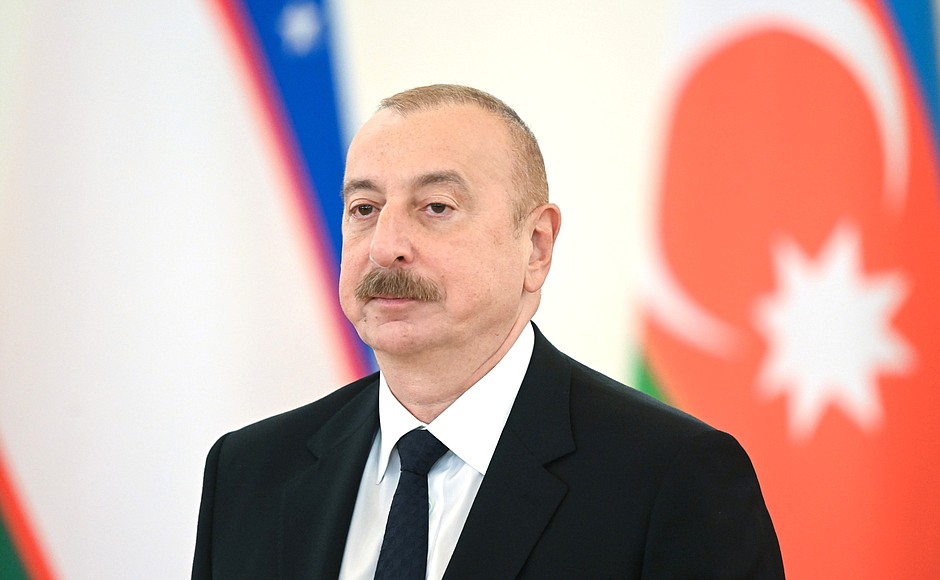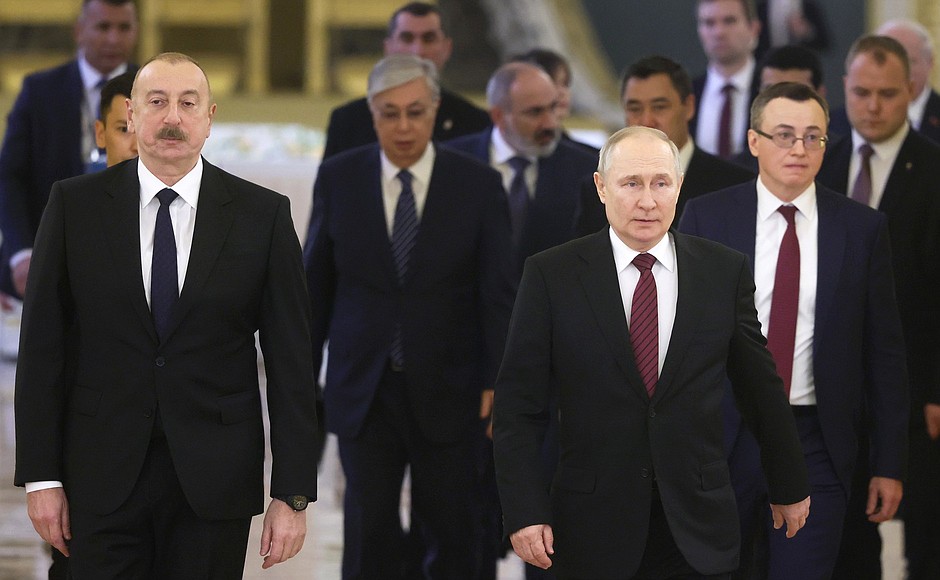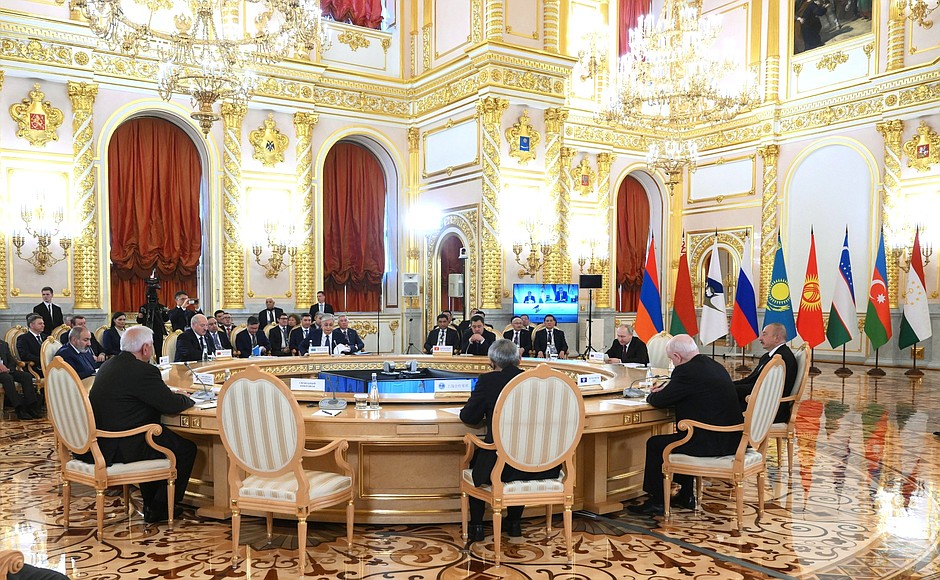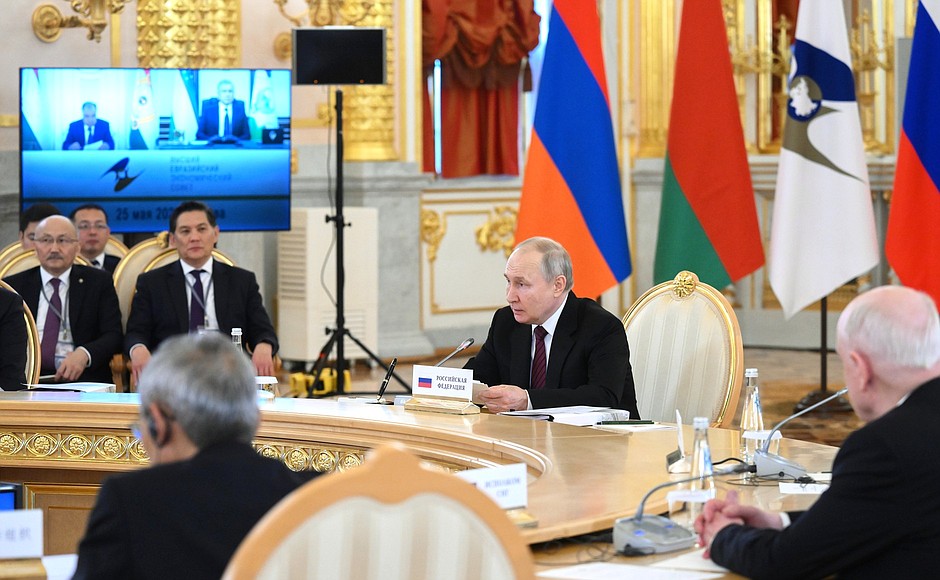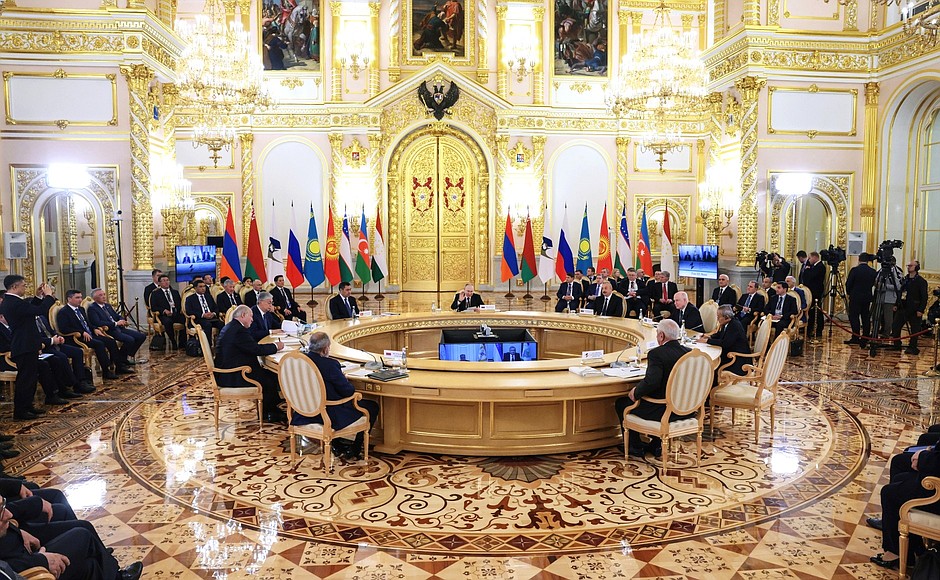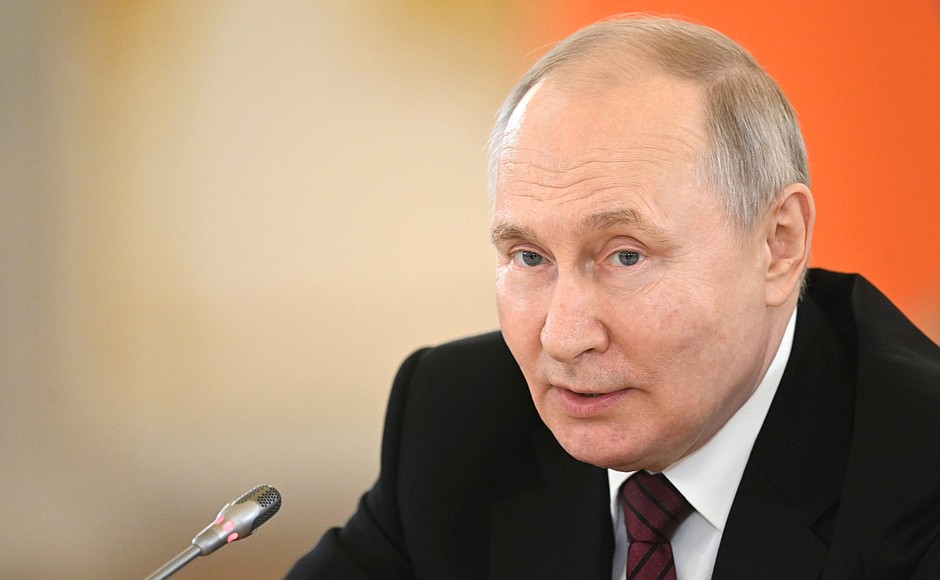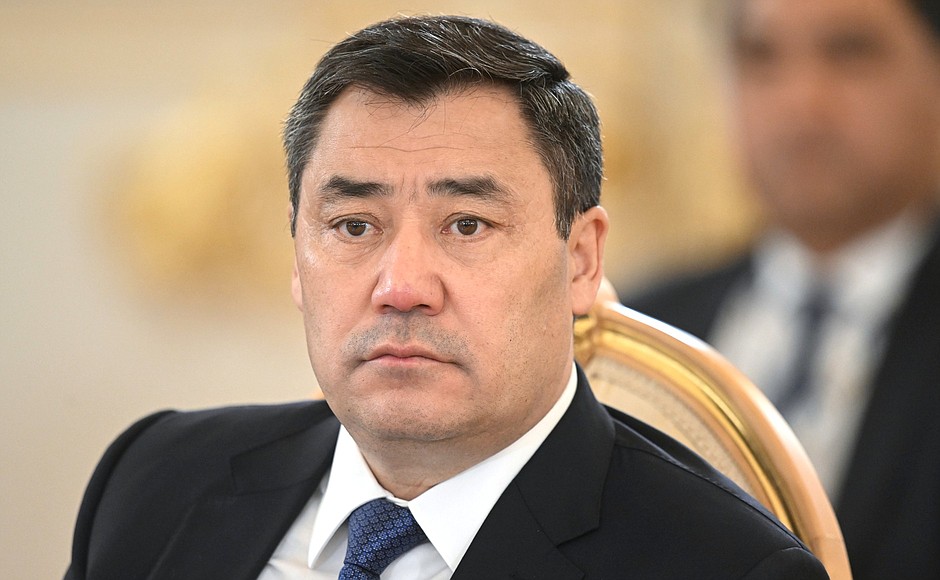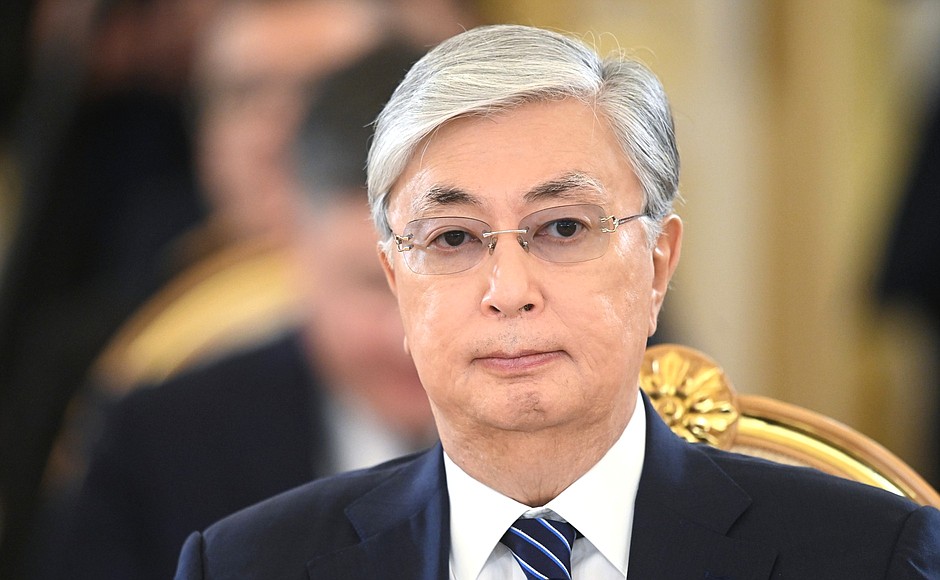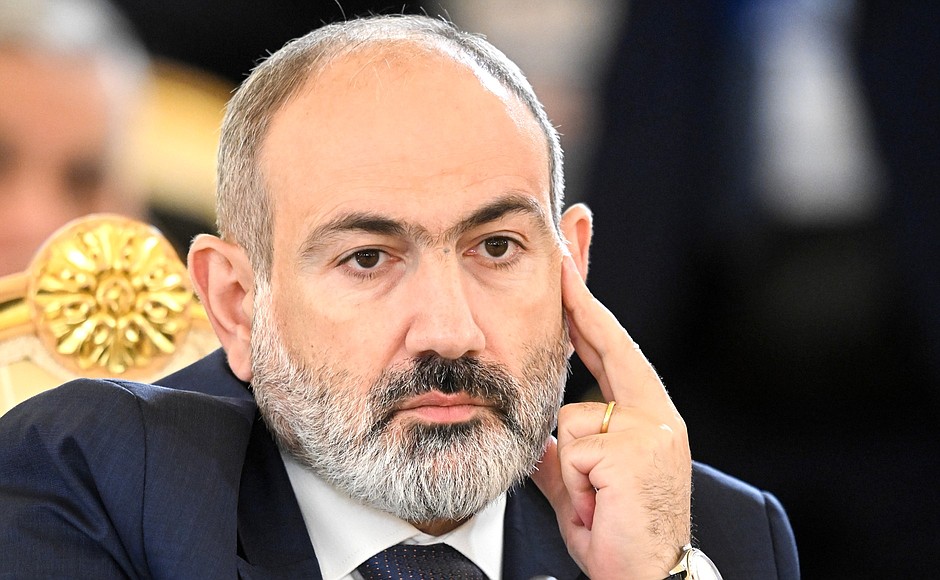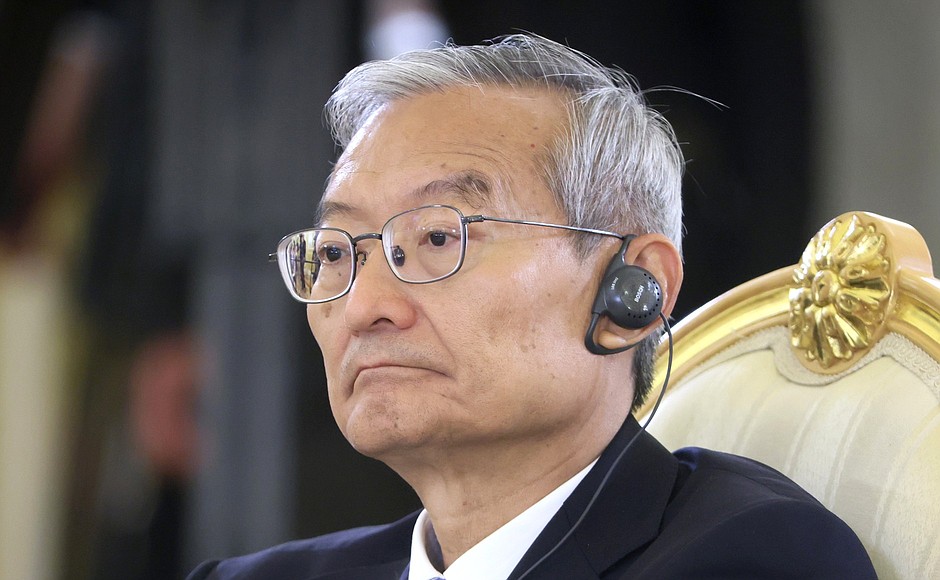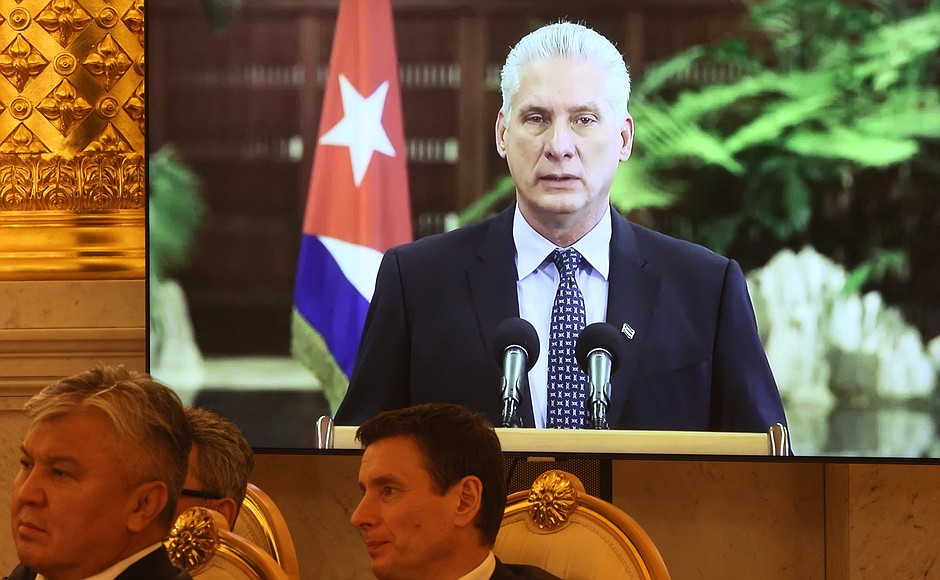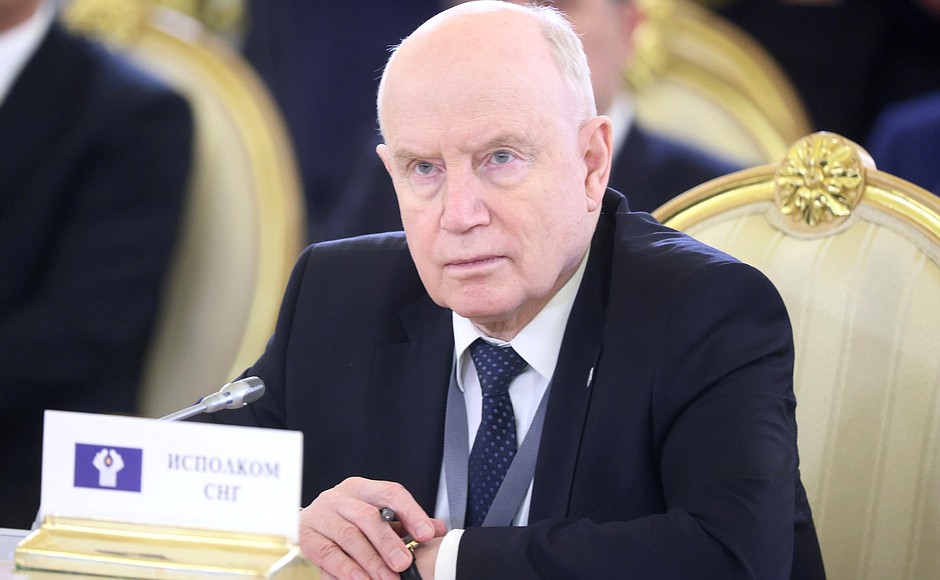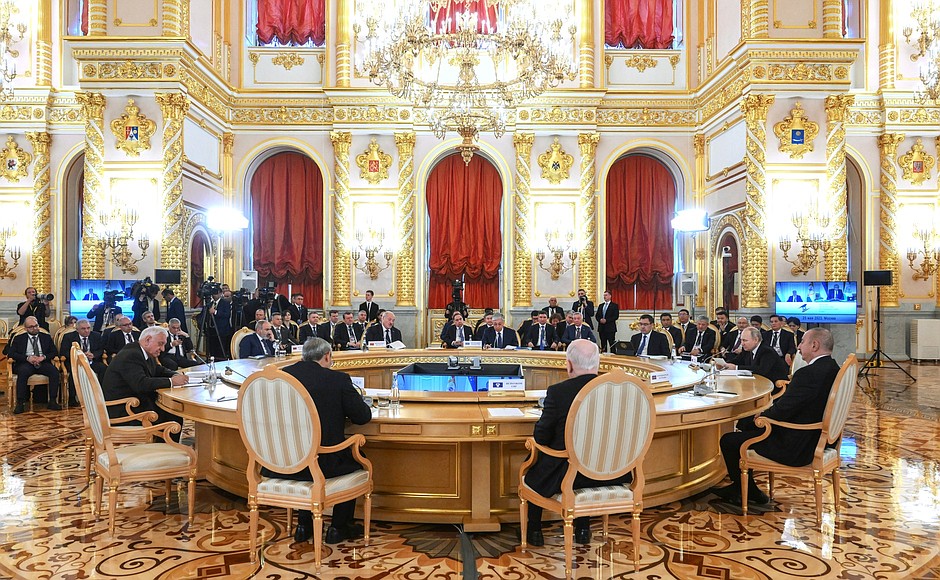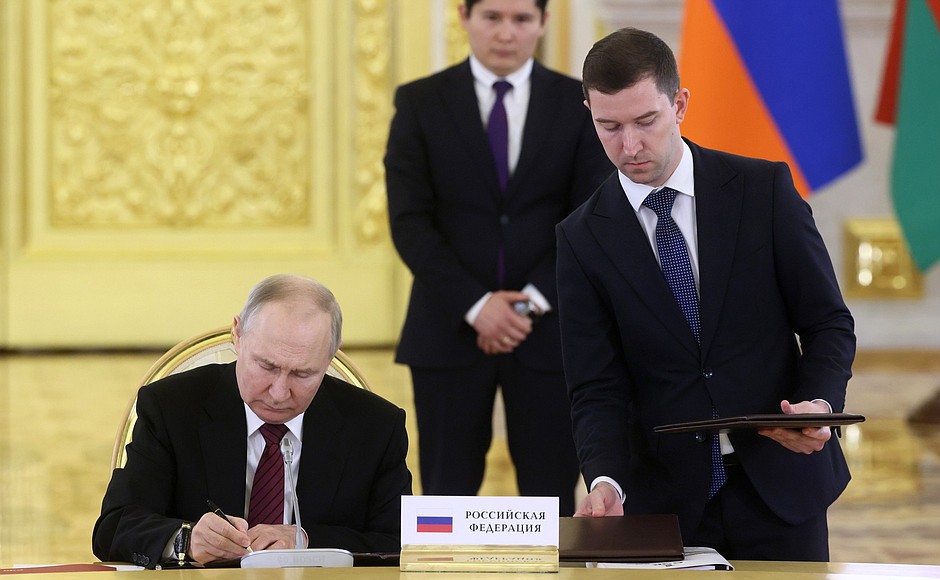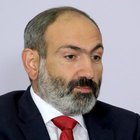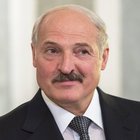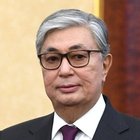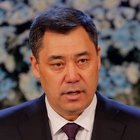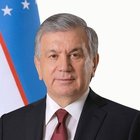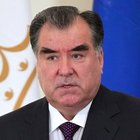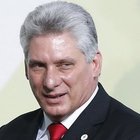The talks began with a restricted attendance meeting that included President of Russia Vladimir Putin, Prime Minister of Armenia Nikol Pashinyan, President of Belarus Alexander Lukashenko, President of Kazakhstan Kassym-Jomart Tokayev, President of Kyrgyzstan Sadyr Japarov, and Chairman of the Eurasian Economic Commission Board Mikhail Myasnikovich.
The talks in the expanded format were joined, via videoconference, by President of Uzbekistan Shavkat Mirziyoyev as the head of an EAEU observer state. President of Azerbaijan Ilham Aliyev and President of Tajikistan Emomali Rahmon (via videoconference) were also invited to join the talks.
Also attending the meeting were Chairman of the Executive Committee, Executive Secretary of the Commonwealth of Independent States Sergei Lebedev, and SCO Secretary-General Zhang Ming.
President of the Republic of Cuba Miguel Diaz-Canel Bermudez sent a video address to the meeting participants.
A package of documents was signed following the Supreme Eurasian Economic Council meeting. In particular, the parties signed the Protocol amending the Eurasian Economic Union Treaty of May 29, 2014 to include provisions on financial assistance to joint projects implemented by the EAEU member states in various industries. They signed several resolutions on amending previously adopted documents. The documents signed by the member states include directives concerning liberalisation plans for certain services segments within the EAEU; instructions based on monitoring the results of the EAEU member states’ abidance by the rules that regulate trade in services, establishment and operation in 2021–2022; and resolutions on the time and place of the next Supreme Eurasian Economic Council meeting.
* * *
President of Russia Vladimir Putin: Friends and colleagues!
We are starting our expanded format meeting now, as agreed. With your permission, I would like to begin with my remarks and then give the floor to each of you. After that, we will sum up our discussion and move on to the documents.
See also
We have just completed our restricted attendance meeting where we exchanged views on important aspects of our association’s activities and outlined strategic goals for deepening integration cooperation. And now, as I said, we will continue with the delegations joining us.
I am pleased to note that President of Azerbaijan Ilham Aliyev is attending today’s meeting as a guest for the first time. I would like to welcome him and the entire Azerbaijani delegation, as well as President of Uzbekistan Shavkat Mirziyoyev, the head of an EAEU observer state, who is joining us online; Mr President, good afternoon; and President of Tajikistan Emomali Rahmon, Mr President, welcome, can you see and hear us? Thank you for being with us today. I would like to express my confidence that your countries will be expanding productive and multifaceted cooperation with the EAEU.
It is symbolic that our meeting is taking place shorty before Eurasian Economic Union Day on May 29, established by decision of the Supreme Council last year to mark the member states’ shared commitment to the further development of integration.
I note with satisfaction that cooperation continues to strengthen within the EAEU, which is consistently asserting itself as one of the independent and self-sufficient centres of the emerging multipolar world. The five member states invariably interact on the principles of mutual benefit and respect for each other’s interests, focusing on ensuring sustainable economic growth and improving the well-being of their citizens.
Russia’s chairmanship of the EAEU this year is aimed precisely at these key goals. At the same time, we will jointly strive to achieve an equally high level of development within our association.
Well, it would be difficult for us to catch up with Armenia. We have already said this today – their GDP has increased by more than 12 percent. This is a very high, serious figure.
We need to make sure that our people are comfortable, feel at home when they come to work, study or do business in one of the other EAEU member countries. We can achieve this by supporting real, 100 percent freedom of movement of goods, services, finances and human capital, and by ensuring the integration of the competitive advantages of our states. The new basic documents for the EAEU’s strategic planning are oriented towards this goal. They will set the main directions for joint actions in the mid- and long-term perspective up to 2030 and 2045. Work on these documents, that include a broad range of integration areas, is already underway, and we suggest stepping up the pace to achieve tangible results before the end of the year. I hope the related departments in our countries will act with this urgency.
As for specific tasks for further interaction within the EAEU, I would like to primarily note the need to develop industrial cooperation and increase the number of new joint production lines under the Made in the EAEU common trademark. It is important to make this brand recognizable as soon as possible and to win popularity among consumers in all our countries. The Eurasian mark of quality on the goods produced in the five member countries should mean that they were made to the highest standards.
Naturally, we must make a coordinated effort to strengthen technological sovereignty in backbone industries of the economy and achieve genuine technological self-sufficiency. In practical terms, I suggest coordinating and implementing uniform priorities for technological transformation and innovation cooperation. This should allow our countries to avoid depending on foreign technology and companies in critical industries, especially when we face certain trends linked with restrictions on cooperation imposed by other countries in these industries. At the same time, it is possible to think about establishing Eurasian technological alliances with interested partners from third countries. These alliances could establish new science-intensive high technology production lines in our states.
Digital sovereignty of the EAEU is also on the agenda. Let me remind you that Russia initiated the process of developing IT partnerships between the five member-countries in 2017. It is important for the states in our union to establish a uniform digital eco system, which implies the integration of national systems for online state services and electronic governments in each of the five member states. I can assure you that Russia has made tangible progress in this respect and has created a very strong foundation.
And of course, joint efforts should be directed at strengthening the financial sovereignty of the EAEU by ensuring a stable credit, banking and payment infrastructure, developing and harmonising the Eurasian financial market. This will create favourable conditions for capital to remain within EAEU borders and for it to be invested in further strengthening the five economies’ economies. To this end, it would be useful to establish a Eurasian rating agency that can provide balanced assessment tools to service the growing economic activity in Eurasia. This will certainly take a principled approach, precise criteria and strict abidance by these criteria – the agency must provide a fully objective assessment. This is the idea. If it doesn’t, it won’t make any sense.
I will also mention that this year, the Russian chairmanship is paying considerable attention to climate change issues. The EAEU Climate and Environment Club could take up the job of synchronising the member states’ approaches across a wide scope, including joint research and development projects, the introduction of green technologies, the achievement of international recognition of Eurasian climate initiatives, the improvement of the state of water ecosystems, the conservation of biological diversity, geological exploration and subsoil development, waste processing projects, and much more.
I would also like to outline a new and apparently promising area for cooperation. I propose introducing – in addition to the four fundamental freedoms of movement including goods, services, finance and human capital within the EAEU – a fifth freedom, which is the freedom of knowledge, based on the general principles and standards of education, healthcare and public administration. This should contribute to the formation of a common cultural space and, if you will, a common Eurasian ideology. We just discussed this in some detail before you joined us and agreed informally on how important this is for all of us. This is especially important for young people, for the younger generation.
At the same time, we should be more active in popularising our association, its achievements and opportunities for citizens of the member states, giving people wide access to reliable information about ongoing integration processes, as well as promoting tourism development within the Eurasian integration perimeter in every possible way, creating a network of new tourism routes.
Without a doubt, educating highly skilled personnel and creating new jobs in the most sought-after economic segments need our support. In this regard, we must strive to coordinate national education and scientific programmes, to harmonise requirements for professions, to develop common education and professional standards, to initiate joint education courses and common textbooks in technical and other disciplines. Inter-university cooperation, internships and academic exchange programmes should be expanded as well. Importantly, students from all EAEU countries should have access to information on these opportunities.
Notably, our continuing efforts to build integration dictate the need to strengthen, develop and modernise the supranational tools and institutions we have created, primarily the Economic Commission, which must be able to provide quick and proper responses to changes around the world and to make professional decisions aimed at protecting our common interests and promoting mutually beneficial integration.
We should think about expanding the commission’s authority, but make sure that the principle of consensus that underlies all key decisions within the EAEU remains the bedrock principle to ensure proper respect for the sovereignty of each of the member countries in the union and make it even more attractive to potential partners and participants.
Of course, the EAEU should expand relations with countries that are seeking equal and mutually beneficial partnership. I am talking about our partners in Asia, the Arab world, Africa, and Latin America. I mean cooperation with multilateral associations like the CIS, the SCO, BRICS and other associations.
It is important to continue to form free trade areas with interested countries and, among other things, to encourage them to jointly use the international transaction infrastructure available to the five member-countries in national currencies and the digital currencies of the central banks.
In closing, I would like to once again thank the leaders of the EAEU member countries for their close cooperation and mutual support when addressing the tasks facing the association. I would like to once again thank the non-members – so far – of our organisation for joining us in our work today. I am confident that by continuing to act as a team, we will certainly achieve new tangible results in promoting integration cooperation in the interests of our states and peoples.
Thank you. As is customary, in alphabetical order, I give the floor to Prime Minister of Armenia Nikol Pashinyan.
Prime Minister of Armenia Nikol Pashinyan: Thank you, Mr President.
Heads of state, colleagues.
I am delighted to see you at the first meeting of the Supreme Eurasian Economic Council this year.
Let me thank the presiding side and President of Russia Vladimir Putin, personally, for the traditional hospitality and excellent organisation of the 30th anniversary meeting of the Supreme Council.
Colleagues,
We had a thorough exchange of views on key issues on the agenda during our restricted attendance meeting. And I would like to briefly mention some of the issues that are relevant to the EAEU.
A wise approach to energy security should also strengthen the potential of national economies. As has been repeatedly noted, a common EAEU gas market coming on stream as planned will contribute to the favourable and mutually beneficial environment for trade in the long term, to ensuring energy security and keeping the member states competitive in the international market.
In this context, Armenia is ready for a constructive dialogue aimed at reaching a consensus on any outstanding issues as soon as possible.
Thanks to the extensive work done by the Commission and the authorised bodies in the member states, we have managed to make significant progress in the development of a regulatory framework for a new format of financing industrial cooperation projects.
The financial assistance for joint projects in various industries will provide us with the opportunity to stimulate specific sectors in our countries. At the same time, we consider it important to maintain balanced development across the economy in order to minimise the risks of stagnation or slowdown in other sectors.
Therefore, even as we select the projects to support, it is important to develop mechanisms that would reduce these risks while opening up long-term prospects for the selected projects.
I would like to note food security as one of the important aspects of cooperation between our countries – ensuring the availability and quality of food for the population, as well as protecting the market from low-quality and dangerous products.
Today, the need to put together a collective food security system has sharply increased. I think that the need to consolidate the efforts of the EAEU countries towards this goal is just as obvious.
I am happy that through various formats of interaction, in 2022 we went on with our planned work to develop mutually beneficial partnerships outside the union. This is borne out by the information presented in the reports on the main areas of EAEU international activity and on the approaches to the development of trade and economic cooperation with the union’s main partners in the mid-term perspective.
Considering the positive dynamics of our cooperation with Iran, the entry into force of a free trade agreement and its subsequent implementation are priority goals for us in the context of expanding trade cooperation with third countries.
Our continuing work on priority and promising negotiations with India and Egypt, as well as the development of a comprehensive dialogue on the economic agenda and the deepening of trade and economic cooperation with the United Arab Emirates and Indonesia will give additional impetus to the union’s integration in the world economy.
Despite the achievements and proceeding from current realities, we must promptly establish effective mechanisms for cooperation with our partners from third countries, which will then create the conditions for the stable economic progress of our economies.
Colleagues!
Obviously, the effective planning of steps to further develop our common economic space implies an open dialogue between entrepreneurs and business circle representatives.
In this context, I would like to make special mention of the Eurasian Economic Forum. Using this opportunity, I would like to thank Russia again for organising these major events and choosing items for discussion that embrace the broadest areas of EAEU interaction.
The forum attracts major political figures and leaders from business, cultural and other circles in our member countries. It has become a key venue for presenting promising ideas and projects and a platform for discussing current issues.
In conclusion, I would like to confirm again Armenia’s willingness to take part in the consistent implementation of joint projects aimed at reaching mutually acceptable solutions to important issues of the functioning of our integration association.
Thank you for your attention.
Vladimir Putin: Thank you very much, Mr Pashinyan.
President of Belarus Alexander Lukashenko, go ahead, please.
President of the Republic of Belarus Alexander Lukashenko: Colleagues!
I would like to join the previous speaker and thank the President of Russia and everyone in this meeting of the Supreme Eurasian Economic Council and yesterday’s forum.
The modern world is undergoing global changes and entering an era of major transition and strategic development. There is increasing awareness of the need to replace the unipolar system of management with new decision-making centres that ensure the consideration of interests of all participants in international relations.
The attention riveted to the events taking place in Moscow today is comprehensive evidence of the fact that the Eurasian Economic Union should become one of these centres.
We have finally made progress in supporting industrial cooperation projects and have drafted a resolution to fund them from the EAEU budget. This is a landmark document and we hope for a good practical return on it.
At the same time, we are going uphill and very slowly on a number of major items on our respective domestic agenda for integration. I am primarily referring to the creation of common markets for gas, oil and oil products, the implementation of the digital agenda items and the liberalisation of the transport market. We spoke about this at length at our restricted-attendance meeting. Meanwhile these activities are fundamental to our economies, and they have become even more important against the backdrop of the sanctions.
The creation of a comprehensive economic union remains our priority. Everyone notes progress on this track, but I stick to my former position – there should be no barriers and no restrictions at all. This is a basic principle for building our union, and we must reach this target as soon as possible.
We have done much in creating a common market for state and municipal purchases. Our market for state purchases is not problem-free but functioning nonetheless.
However, to ensure its full-scale development, we must sign an agreement on mutual recognition of bank guarantees for state purchases and rules for the mutual recognition of e-digital signatures and ensure its entry into force as soon as possible.
Moreover, there is a reserve for expanding a relevant sector of economic relations. Apart from state purchases, we also have state corporations. I believe the union’s economy will gain from the lifting of restrictions on access to purchases by state corporations.
The improvement of transport infrastructure and development of effective logistics are also a priority for the union. At the restricted attendance meeting, the President of Kazakhstan raised this issue and cited examples showing how important it is for developing our union.
Considering the turn of our export flows to the southeast, it is very important to cut a corridor through to the countries of this region. This is a limitless market for our goods.
At the same time, we must provide equal access to the infrastructure that already exists or is in development, to prevent further unpleasant incidents similar to what happened with exports of timber and, as Kazakhstan claims, black coal, to third countries through the territories of the member states.
I believe it would be reasonable to resume the discussion of more relaxed rules for road freight shipments to third countries without special authorisations.
I also would like to cover a relatively new but rather topical aspect of our integration, or the Union’s climate agenda.
For several years now, we have been watching Europe actively prepare for trading in the current conditions. The mechanism of trans-border hydrocarbon regulation, currently in development in the EU, will become a serious instrument of impact on international trade. The European Union will get yet another opportunity for manoeuvring: commodities recognised as “clean” will be admitted to the market while unnecessary products will be simply blocked, which is something they know how to do. Therefore, it is important for the Union to consolidate efforts and develop our own approaches and measures in response to climate challenges. It is necessary to consistently move towards a structure of the economy with prevailing low-emission production and technology.
Our response to the sanctions pressure is intensifying cooperation within the SCO, BRICS and ASEAN, closing new trade agreements and constructive and mutually beneficial cooperation with everybody who is interested in being our friends and partners. Having said that, I want to note that as a result, we must ensure the balance of interests between all the parties involved. It is not an easy task but I am confident that the commission has the skills and competence required.
Finally, I want to note: Belarus supports the course initiated during Russia’s presidency for determining approaches to forming a new development strategy for the Eurasian integration until 2030 and perhaps until 2045.
On the same lines, I want to stress that, when developing topical strategy-related documents, the Union may be interested in the similar past experience of the Union State of Belarus and Russia. The President of Kazakhstan spoke about this experience at length at the forum yesterday.
That said, I would like to warn all of us against excessive strategic planning. It is easy and we know how to do it. This useful work should not prevent or substitute for the actual steps towards achieving the goals and objectives of the EAEU Treaty that the member states and the commission are already taking. There are a host of specific issues that need to be addressed and they lie on the surface.
Colleagues, I believe that, by taking joint efforts, we can fully realise the potential of this union internally and externally, thus creating one of the full-weight responsible centres of the new multipolar world.
Thank you.
Vladimir Putin: Thank you very much.
President of Kazakhstan Kassym-Jomart Tokayev, please.
President of Kazakhstan Kassym-Jomart Tokayev: Friends,
I would like to express my gratitude to President of Russia Vladimir Putin for organising this summit and of course, for the usual warm welcome. The reception was exceptionally warm this time.
Greetings and salutations to the leaders of the Eurasian Economic Union member states, the heads of observer states, as well as our friends and partners from the CIS and the SCO.
Colleagues,
Geopolitical upheavals have had a significant impact on the economic situation around the world. This year, international financial institutions, on average, have almost halved their growth forecasts for the global economy. However, despite the pressure from external factors, our cooperation within the Eurasian Economic Union shows positive dynamics. The participating countries maintain macroeconomic stability; they are accelerating economic growth and mutual trade.
For my part, I would like to note that over the years of the Eurasian Economic Union's activity, Kazakhstan's trade with other member states has grown by 74 percent, while exports have grown by 98 percent. We consider these to be good indicators. Major joint infrastructure projects are being implemented; industrial cooperation is on the rise; a common services market is being formed, and the share of national currencies in mutual payments is increasing. The Development Strategy until 2025 is being systematically implemented. All this demonstrates the high level and wide range of integration between the participating countries.
At the same time, in the current geo-economic conditions, a more effective tapping of the EAEU’s potential, the elimination of bottlenecks, if any, is our common priority.
We are going to fully implement all the plans we made at the outset. At the same time, despite the obvious achievements, it is imperative we do not become heady with success.
There is a lot of work ahead. First of all, we need to focus on achieving the first of the four freedoms – the free movement of goods. This includes creating a single and truly barrier-free market and ensuring the unhindered transit of goods to third countries. I believe that the full achievement of these goals should be a key area of work for governments and the Eurasian Economic Commission.
I am convinced that at this stage in the development of integration, we must move away from the tactics of piecemeal decisions, ad hoc arrangements and manual management. We need a full-fledged, systematically functioning internal market of the Union. Only then will national businesses and foreign partners fully believe in the Union’s potential.
Next. It is important to work together to expand markets for our exporters’ goods. One of the Union’s key objectives is to agree on the most favourable trade conditions with third countries on the basis of a strong coordinated joint position.
It is important to continue a systematic dialogue with integration associations and countries with which cooperation is of economic interest to us.
The Commission should promptly conclude a free trade area agreement with the United Arab Emirates, India, Egypt, Indonesia and Israel. We should substantially strengthen cooperation with the SCO, ASEAN, Mercosur and other international organisations. I think the interest in cooperation with these organisations is mutual.
Next. We consider it important to develop and formalise an observer institution at the Union. This institution should become a mechanism for effective and mutually beneficial cooperation. That is, interaction with relevant rights and obligations on market access, compliance with common rules, technical standards and other issues.
The Commission will consider the possibility for observer states to join individual treaties within the Union, as well as the opportunities for their participation in specific cooperation and infrastructure projects. I think our partners will be particularly interested in cooperation in the energy sector, agriculture, transport and logistics.
I believe that the Commission should update the relevant list of agreements and projects. It would be right to define the procedure for third countries' participation in certain projects of the Eurasian Economic Union. The implementation of such mechanisms will contribute to the development of our integration association as a pole of economic attraction throughout the Eurasian space.
The development of industry is the next issue.
In order to promote cooperation in this area, we have begun implementing an entire range of multilateral cooperation projects and intergovernmental programmes. Our successful cooperation with our Russian and Belarusian colleagues under the Earth remote sensing interstate programme is a good example.
There are other projects in the works, but the world and our competitors are not standing by idly, so we must join our efforts. In this context, we praise the decisions made today on the mechanisms of full financial assistance to joint projects, which is a practical step towards what we need.
In the current geopolitical situation, Kazakhstan, considering its location and capabilities, is ready to serve as a centre for the development of the Eurasian industrial cooperation and integration. This can include joint measures to produce e-cars, mainline locomotives, carriages, agricultural and passenger vehicles, building materials, and chemical products. Much of these products are already in practical development.
We are also ready to implement joint projects to develop deposits of ferrous and non-ferrous metals with further processing and production of finished products. Separately, I would like to note our successful cooperation with the Russian Federation in these areas. Over the last couple of years alone, major projects have been implemented to produce trucks, mainline diesel and electric locomotives, products for the railway industry, and tires. A number of large projects are on the way.
Another important area for further integration may be the creation of new international transport routes. I am confident that our economic union will ultimately become a link between Europe and Asia, the global South and North.
We welcome the intention of the Russian Federation to form corridors in the direction of China, India, Pakistan, Iran, countries of the Middle East and Southeast Asia.
I believe it is high time to develop the North – South transport corridor in conjunction with the trans-Caspian route. In this context, Kazakhstan will serve as a reliable logistics hub of the Eurasian Economic Union using all its capabilities and resources.
As a practical initiative, we suggest launching high-speed cargo trains on the 2,873-km Chelyabinsk-Bolashak-Iran railway line. We can use the current infrastructure of the North-South Transport Corridor along with the construction of a freight hub in Chelyabinsk.
We are prepared to eliminate the bottlenecks on our Beyneu-Mangystau railway network and the Beyneu-Shalkar highway section. Kazakhstan will certainly pursue this, understanding the need for a common effort to create proper freight service.
The construction of the Bakhty-Ayagoz railway route will be a good example of mutually beneficial cooperation. This railway would make it possible to considerably increase both Kazakhstan and Russia’s capacity to deliver cargo to China.
We should also consider the possibility for joint investment in building infrastructure at the sea and dry ports of Iran and Turkmenistan. This would substantially increase the geography of exports for the member states and strengthen our logistics potential.
Along with the development of the physical infrastructure, it is very important to draft practical decisions on creating a common digital system for transiting goods. It must be reliable but easy to use and be based on advanced digital technology.
We must agree on using electronic seals and guarantee systems for operational information exchange and develop a one-stop consignment system. This will allow us to create a common digital multimodal corridor that will expedite commodity traffic and streamline supply chains.
We have big opportunities for cooperation in digitisation, tourism and the agro-industrial sector. Our countries have achieved positive results at the national levels but are short of integration projects.
Overall, I believe the Eurasian Economic Union has proven its value and efficiency in both calm and crises periods. It is important to consistently and systemically implement this huge potential for the benefit of our countries.
This is critically important, because economic integration is, above all, a key tool for economic growth and the prosperity of our citizens. Accordingly, the measure of success or failure of the integration efforts is simple and straightforward: businesses and individuals must feel that they work and live better as a result of the Union’s activities. Only then will the authorities have any credibility with them in order to take further integration steps.
So, Kazakhstan’s vision of the Union’s future includes a steady increase in the economic potential of our countries, which includes projects, technology, jobs and taxes.
I am absolutely confident that if we join our efforts we will successfully fulfil all our goals and bring the Eurasian Economic Union to a higher development trajectory.
In closing, I would like to spend a moment discussing one more issue which, I believe, is important. Next year, our association will turn 10, and we will come together for an anniversary summit. I believe this landmark event is a good occasion for running a detailed analysis of the path we have travelled and to identify the Union’s strategic prospects.
In this regard, I propose instructing the Commission to draft a report on the first phase of Eurasian integration to be delivered at the next meeting of the Supreme Council. It will cover the main results and achievements, as well as specific recommendations for further integration-driven development.
Of course, a decade of our integration association is an important milestone that should be celebrated at the appropriate level. Holding the anniversary meeting in Astana would be a symbolic move, since the Treaty on the Eurasian Economic Union was signed in the capital of Kazakhstan.
I am grateful to my colleagues for their unwavering understanding, trust and constructive dialogue.
Vladimir Putin: Thank you very much for your remarks and proposals.
Please, President of Kyrgyzstan Sadyr Japarov, the floor is yours.
President of Kyrgyzstan Sadyr Japarov: Heads of state, participants in the meeting,
I would like to welcome all of you to Moscow and thank the President of Russia for the warm reception and excellent organisation of our work.
We met in Moscow just recently on the occasion of our sacred holiday – the Day of the Great Victory. Today, we are meeting for this year’s first session of the Supreme Eurasian Economic Council and for the second Eurasian Economic Forum.
The Eurasian Economic Forum as a dialogue platform for discussing current issues of Eurasian integration and plans for development was launched in Bishkek exactly a year ago. At that time I expressed the hope that this format would become a success and hold a befitting place in the international arena.
Yesterday, we witnessed the expansion of the geography of forum participants, a constructive exchange of views and a live dialogue. I am convinced that we are moving in the right direction. I have no doubt that the Forum will produce new common approaches to the further development of Eurasian integration.
Colleagues,
The current political and economic turbulence is creating new challenges and testing the strength of not only countries but also their associations. Our Union is not an exception in this respect. Yet, we are succeeding through a concerted effort in maintaining sufficient economic activity despite the negative impact of external factors.
Thus, in the first quarter of this year, the Union’s agricultural output grew by almost 3 percent, the implementation of construction by 9 percent and investment in fixed assets by 4.3 percent. From January to April this year, the GDP of the Kyrgyz Republic went up by 4.4 percent and industrial production grew by 4.6 percent. Kyrgyzstan’s foreign trade increased by 25.4 percent in January-March 2023.
Owing to the smooth operation and interaction of our countries, we are successfully promoting the integration agenda in our Union. We did a lot of analytical and practical work on implementing the strategic goals of Eurasian economic integration to 2025. I consider it necessary to make practical use of our groundwork and the conclusions reached in the analytical reports. Some of them should be reflected in the new integration interaction strategy to 2030 and to 2045.
Colleagues,
Today, we are laying a solid foundation for expanding industrial cooperation and import substitution. The signing of the Protocol on Amendments to the Treaty on the Union as related to the provision of financial assistance for joint cooperation projects in a variety of industries will promote joint production, encourage investment growth and create new jobs. We must further expand the financial assistance mechanism that is being created with the use of stable financing sources, including the revenue from import customs duties.
This tool can be used to support the implementation of cooperation projects in other areas of the economy, such as agriculture, transport and logistics infrastructure, innovations and power industry.
Speaking of transport and logistics infrastructure, I would like to highlight the need to build new transport corridor infrastructure, in particular along the North-South and East-West corridors.
Last year, a list of priority infrastructure integration projects in transport was approved. We must step up our efforts to expand this list with due account taken of long-term prospects and to create an environment for the successful implementation of the projects, including in terms of their funding.
Along with that, I suggest paying special attention to ensuring access to transport corridors for landlocked EAEU countries.
At the same time, in order to speed up the delivery of goods, I consider it important to create a multimodal transport ecosystem with digitised shipping documents.
The current geo-economic world order is calling on us to implement effective solutions to maintain and increase mutual and foreign trade. Minimising controls at internal EAEU borders and increasing the transparency of regulations are part of addressing this task.
For these purposes, the Agreement on the Use of Navigation Seals in the Union was signed and entered into force. It will also eliminate the risks of illegal movement of goods and increase the EAEU member states’ transit appeal.
The success of this agreement will be measured by achieving its goals, including the creation of favourable conditions for conducting bona fide business and the elimination of unnecessary barriers and red tape when administering control activities. I hope the governments of our five member states will spare no effort in achieving this goal.
Colleagues,
We are going through uneasy times in an uncertain foreign economic environment. This is a time not only for change but also for mutual support and complementarity rather than the creation of sectoral obstacles, not to mention barriers.
This past year has shown how we can come together in a difficult situation for reaching common goals. This is proved by the joint measures we adopted to maintain macroeconomic stability. As they say, it is easier to prevent a disease than to treat it. It is easy to shut each other out, but hard to open up later.
I consider it necessary to strengthen interaction between our countries’ government bodies by exchanging experience and the necessary information. At the same time, the Commission should help government bodies identify and mitigate obstacles in areas of uniform regulation and strengthen the potential for national services and bodies. I believe this approach will reduce the level of barrier tensions.
Migration is a major step on the way to creating favourable conditions for ensuring the four freedoms in the Union. I believe the working citizens of our countries should have relaxed conditions for implementing their labour rights in any member state of our Union.
Modern technology is making it much easier for our citizens to pass through the required administrative procedures in a state of employment. It is necessary to grant people the right to apply for employment in another country online, including while they are in their country of citizenship.
As a first step, it has been suggested that we consider the possibility of recognising the results of medical examination in the country of departure for a stay in the Russian Federation similarly to the Travel without COVID-19 application. Its function can be expanded to meet these new needs.
Colleagues,
In conclusion, I would like to thank all of you for your constructive work and wish Russia and President Putin personally a successful year as Russia presides in the Union’s bodies.
On the eve of the Day of the Eurasian Economic Union that we will celebrate on May 29, I would like to note that the EAEU continues demonstrating its efficiency and ability to find compromise solutions. All that remains for us to do as the heads of the Union member states is to develop and strengthen our association for the benefit of our countries and peoples.
Thank you for your attention.
Vladimir Putin: Thank you very much, Mr Japarov.
Colleagues,
According to the approved regulation, I will next give the floor to the heads of the EAEU observer states: Uzbekistan and then a video message from the President of Cuba, and after that, the heads of the invited states, Azerbaijan and Tajikistan.
Thank you for adopting this regulation. And now I am pleased to give the floor to President of Uzbekistan Shavkat Mirziyoyev.
Please, Mr President.
President of the Republic of Uzbekistan Shavkat Mirziyoyev: Colleagues,
I am sincerely happy to welcome all of you to the meeting of the Supreme Eurasian Economic Council.
I would like to second my colleagues and express my gratitude to President of the Russian Federation Vladimir Putin for organising our meeting. There is no doubt that Russia’s effective chairmanship in the EAEU will serve to promote new areas of multifaceted partnership between our countries.
Colleagues,
As an EAEU observer state, Uzbekistan continues to take an active part in multilateral events and projects aimed at developing mutually beneficial trade and economic cooperation within the association.
First, effective work has been carried out jointly to create favourable conditions and look for new points of growth and opportunities for expanding trade relations. Last year, trade between Uzbekistan and the EAEU countries increased by 23 percent. Steady growth dynamics are being observed this year as well.
Second, we have made serious progress in industrial cooperation. In the last few years alone, hundreds of projects and enterprises have been launched in our country in priority sectors in cooperation with companies from the EAEU countries.
Third, effective platforms have been created to promote the business dialogue, including involving the potential of our countries’ regions. As an example, I would like to cite the now traditional INNOPROM. Central Asia International Industrial Trade Fair. In April, this forum was successfully held for the third time in Tashkent, bringing together over 2,000 companies from our countries. As a result, investment agreements and trade contracts worth over US$10 billion were concluded.
Fourth, we are promoting institutional mechanisms, developing close and constructive cooperation with the Eurasian Economic Commission and are actively engaged in the activities of EAEU bodies.
Within the framework of the three-year joint work plan, more than 200 events were held to harmonise legislation with international standards, exchange experience in regulating the economy, and remove barriers that hinder the development of mutually beneficial cooperation in the trade and economic, transport and communication areas.
Uzbekistan has joined individual programmes and sectoral projects to simplify trade procedures, as well as in the field of transport, agriculture, the environment and tourism. Our immediate plans include holding the next meeting of the joint working group in August.
At the same time, the analysis of the current situation also shows there is a number of constraining factors and unresolved issues, such as the lack of a mechanism for implementing observer state initiatives aimed at developing practical interaction within the association. In addition, issues related to the application of trade restrictions in the EAEU countries, including with regard to the supply of agricultural products, energy carriers and other commodities, have not been resolved. So far, the projects initiated in the transport and logistics area, in particular, on the accelerated mutual transport of high-quality and affordable food products, have not yielded the expected results either.
Colleagues,
Intensification of global challenges, serious breaks in supply chains, growing risks in food and energy security and other problems necessitate closer coordination in order to resolve the priority tasks of the sustainable socioeconomic development of our countries. I hope this summit will allow us to align our positions and identify priority areas for practical cooperation.
First, Uzbekistan is ready to continue the joint work to simplify trade procedures and create conditions for a radical increase in trade between our countries. We believe that this will be facilitated by the adoption of an agreement lifting technical barriers and mutually recognising certificates. In order to do this, Uzbekistan has completed the preparatory work to harmonise national technical regulations with EAEU standards.
We will also continue work on promoting mutual settlements in national currencies.
Second, we believe the expansion of economic cooperation and business contacts will be facilitated by the integration of online platforms and systems for customs administration, sanitary, phytosanitary and veterinary control, as well as certification of the origin of goods. We are ready to hold substantive consultations at the expert level to develop mechanisms for implementing this initiative.
Third, we consider it important to take joint measures to deepen industrial cooperation and localisation as an important factor in creating new jobs and forming industrial hubs in the Eurasian space.
We are interested in taking part in multilateral programmes aimed at providing financial assistance in implementing cooperation projects, such as the business community’s initiative for reinsurance and practical cooperation between national development institutes.
To build a long-term partnership with the business community, we will also join the work of the EAEU Business Council.
Fourth. Interaction in transport and transit is a strategic area of our partnership. In the current environment, it is important to improve joint efforts to create alternative transport corridors and sustainable logistics chains.
We support the development of the North-South international routes and other roads that connect our region with China, the Middle East and South Asia. We speak for close coordination as regards tariff policy. We also invite you to join the work of a project management office engaged in the construction of the Uzbekistan-Afghanistan-Pakistan railroad.
Fifth, we believe that it is important to expand our cooperation in food security. In this context, it is important to promote active import substitution of agricultural products and food. These products, produced in our country, will provide for the comprehensive functioning of the green corridor, including the Eurasian Agroexpress. It is also important to support joint scientific and applied research and innovations, as well as to provide comprehensive support to our countries’ agrobusinesses and promote the development of cooperation ties. To that end, we suggest holding an agricultural forum in the EAEU Plus format with the participation of agriculture ministers and leading food producers and importers this October in Uzbekistan.
Sixth. Uzbekistan is also interested in expanding cooperation as regards training highly-skilled professionals, building partner ties between universities and centres of professional education, taking part in joint projects and supporting scientific research. We believe that it is necessary to develop a roadmap on the joint training of high-demand specialists in engineering.
Colleagues,
I want to thank you once again for the support of Uzbekistan’s participation in the programmes and projects of the multilateral partnership within the Eurasian Economic Union. I am confident that the results of today’s meeting with facilitate the development of new areas, forms and tools of mutually beneficial cooperation in the interests of our countries’ sustainable development and prosperity.
Thank you for your attention.
Vladimir Putin: Thank you very much, Mr Mirziyoyev.
And now I will ask to play the video address by President of Cuba Miguel Mario Díaz-Canel y Bermúdez. Go ahead, please.
President of the Republic of Cuba Miguel Díaz-Canel y Bermúdez (retranslated): Mr President of the Russian Federation Vladimir Putin,
Heads of delegations and member states of the Supreme Eurasian Economic Council,
Friends,
First of all, I would like to express my deepest appreciation to the Government of the Russian Federation. On behalf of the people and the Government of Cuba, I thank you for the invitation to this Council meeting.
Just like other meeting participants, I want to highlight the Russian Federation’s outstanding work as the chair of the Eurasian Economic Council bodies in early 2023.
Since our last meeting, the international situation continues to develop under a dire scenario caused by a multifaceted crisis, which is a logical result of the unjust world order, aggravated by the pandemic and other challenges.
This economic, social and financial crisis affects the poorest countries and poor people the most and has been consistently deepening and aggravating while at the same time exacerbating inequality and poverty.
Some economically powerful states, despite increasing accusations and criticism, continue to use appalling and unacceptable policies in order to interfere, through unilateral sanctions and media manipulation, in the domestic affairs of other sovereign countries, thereby causing political destabilisation and international isolation of governments that adhere to the ideas of socioeconomic development of their societies and a more just world order.
Such organisations as the Eurasian Economic Union confirm that it is possible to achieve a different type of relations between countries. Since its establishment eight years ago, the Eurasian Economic Union has been actively developing as an integration mechanism and alternative model that can unite the will of peoples and means and resources to confront modern global challenges such as climate change, shortage of resources and poverty.
The importance of this Union has been growing both at the regional and international levels, as evidenced by such impressive results as growing trade between its member states and the increasingly common use of national currencies in settlements.
Colleagues,
In this complex and troubled international environment, Cuba remains loyal to the idea of building a more just world order, in which the legitimate interests and development priorities of the countries of the South would prevail.
We will continue to work tirelessly to fulfil the honourable task entrusted to us by the Group of 77 plus China as the chair of this important, representative and diverse organisation of developing countries in 2023.
As an observer member of the Eurasian Economic Council, Cuba believes that the various growing needs of our countries can be met only by expanding trade and partnership ties according to the potential of each country. There is currently an opportunity to increase mutual exchange between our countries in such areas as food and energy security, investment in the industrial and technological development, pharmaceuticals and biotechnology, personnel training and many others.
Our country enjoys extensive and multifaceted relations with the countries of Latin America and the Caribbean, which could help us become a bridge for building strong and beneficial ties between the EAEU member states and the countries of both regions. Latin America and the Caribbean have vast potential and recognised advantages for intensifying trade and economic cooperation in various spheres, as well as vast reserves of strategic natural resources and impressive human capital.
Your excellencies, friends,
Unfortunately, due to my work schedule and other logistics constraints, I cannot meet with you in Moscow this time. But I am happy to tell you that the Cuban delegation led by Prime Minister of the Republic of Cuba Manuel Marrero Cruz will attend the meeting of the Eurasian Intergovernmental Council to be held in Sochi in June. We hope that the direct participation of Cuba’s top officials in this meeting and side events will be fruitful and productive for mutual exchange of experience with all participating states and will become the foundation for new mutually beneficial projects.
I would like to confirm again that Cuba prioritises expanding ties with all member states of the Eurasian Economic Union and that we attach particular importance to the third meeting of the joint commission of Cuba and the Eurasian Economic Commission, which will provide an opportunity to assess new potential and prospects of trade and investment cooperation, as well as for expanding mutual exchange in various spheres.
You can always count on Cuba and its contribution as an observer member of the Eurasian Economic Council to strengthening unity, complementarity and respect for diversity in the interests of the development and wellbeing of our nations.
Allied and just relations between all countries are a guarantee of a multipolar world, which is essential and which our people are striving to create.
Thank you very much.
Vladimir Putin: Let us thank the President of Cuba for his address.
I am pleased to give the floor to our guests.
I am passing the word to President of Azerbaijan Ilham Aliyev. Again, he is attending an event of this sort for the first time.
Mr Aliyev, go ahead please.
President of Azerbaijan Ilham Aliyev: Mr President, colleagues,
First of all, I would like to thank the President of Russia for the invitation to take part in this EAEU summit as a guest.
Azerbaijan’s cooperation with the EAEU countries, except Armenia, has been making steady headway for 30 years. There are serious conditions for normalising relations between Azerbaijan and Armenia, based on the mutual recognition of territorial integrity and sovereignty.
A trilateral meeting between the heads of Russia, Armenia and Azerbaijan will take place today at Russia’s initiative.
I would like to tell my colleagues that last year, Azerbaijan’s trade with the EAEU countries increased by 31 percent to constitute US$4.7 billion. In January-April this trade went up by another 38 percent. Last year, the share of EAEU countries in our foreign trade totalled about 9 percent. We believe there is great potential for further growth in trade.
Azerbaijan is located at the geographical crossroads of the East-West and North-South transport routes. The transport and logistics system of our country makes it possible to carry transport operations in any direction.
Azerbaijan has the largest commercial fleet in the Caspian Sea – over 50 vessels. We will soon modernise the Alyat seaport, designed to transport 15 million tonnes of freight. Its new transloading capacity will reach 25 million tonnes. This is particularly important, considering a large increase in freight traffic that has been passing through Azerbaijan lately.
A modern shipyard has been operating in Baku for several years now. Ships of any type can be built here. I am happy to say that today Azerbaijan offers its shipbuilding capacity to its Caspian neighbours. Talks are already underway, and we are working hard to fulfil orders for our Caspian neighbours at the shipbuilding plant in Baku.
The Baku-Tbilisi-Kars railway provides access to Europe and Mediterranean ports in Turkiye. Azerbaijan is an important participant in the North-South transport corridor project. We also initiated the construction of the Zangezur Corridor that will connect the main part of the country with the Nakhichevan Autonomous Republic and will become part of international railway routes.
Azerbaijan has eight international airports, two of which, in Fuzuli and Zangilan, have been built in the past two years on the territory liberated from occupation. The ninth international airport is under construction in liberated Lachin and will open in 2025.
Our country boasts one of the region’s largest air cargo fleets with a freight volume of over 500,000 tonnes per year. The Azerbaijani economy has remained sustainable and has been growing throughout almost the entire period of independence. We have achieved complete economic independence, which is an important factor allowing us to pursue an independent foreign policy, which we are effectively doing.
For about four years, Azerbaijan has been successfully chairing the Non-Aligned Movement, which brings together 120 states and is the next largest international institution after the UN.
The Azerbaijani economy is self-sufficient and does not need outside support. Over the past 20 years, our country's gross domestic product has more than tripled, and poverty has gone down from almost 50 percent to 5 percent. External debt is at less than 9 percent of GDP and is declining every year. Azerbaijan's foreign exchange reserves exceed the external debt by ten times.
Today, one of our core goals is to diversify our exports. The economy is being diversified successfully with the non-resource sector accounting for most of the Azerbaijani economy. We need to do more to boost our non-resource sector exports.
Even though the unemployment rate stands at a low 5 percent, demographic growth – Azerbaijan's population has grown from 7 million to 10 million over the past 30 years – calls for energetic efforts to create new jobs.
Of course, we hope to strengthen our active interaction with the EAEU member states both bilaterally, which we are successfully doing, and multilaterally.
As was noted earlier, this is the first time I am participating in the EAEU summit, although I meet with the heads of the EAEU member states regularly both within the framework of CIS summits and in the bilateral format. So, although this is the first time I am here as a guest, I am definitely not just a guest here. Today, we already had the chance to talk, and our communication will continue.
Mr President, in closing, I would like to once again express my gratitude to you for inviting me and to all my colleagues for supporting this invitation.
Thank you.
Vladimir Putin: Thank you very much.
Indeed, in the bilateral format, Azerbaijan’s economic ties with the EAEU countries are continually on the upsurge. They are important for all of us, for both Azerbaijan and every EAEU country.
The same is true of our relations with Tajikistan.
President Rahmon, go ahead please. You have the floor.
President of Tajikistan Emomali Rahmon: Thank you.
Colleagues,
To begin, I would like to thank President of the Russian Federation Vladimir Putin for the invitation to take part in the meeting of the Supreme Eurasian Economic Council as a guest.
The EAEU member states and observers are Tajikistan’s traditional partners. We are interested in consistently strengthening our bilateral cooperation in all areas of mutual interest.
Tajikistan has close trade and economic ties with the majority of the EAEU member states and observers. Our trade is stable and is growing every year. Last year, the share of EAEU countries in Tajikistan’s foreign trade exceeded 42 percent. Almost half of our exports go to the EAEU countries.
We are ready to further increase the export of our goods to the EAEU states, primarily, ferrous, rare and precious metals, textiles, cotton, as well as fruit and vegetables.
Transport plays a major role in our interaction with the EAEU countries. In this area, we should focus on the existing problems that we must resolve together. This is primarily the limited capacity of the border crossings between our countries. We also need new vehicle and railway connections, including rolling stock, for shipping in conditions of freight traffic imbalance.
We must bear in mind that during trade liberalisation and the removal of barriers to the free movement of goods, the requirements for transport services become more challenging. This particularly concerns speed, reliability and the quality of shipments. We are conducting serious institutional reforms in Tajikistan for these purposes. Since mid-2020, our country has adopted a one-stop system for processing export, import and transit transactions. We intend to continue promoting transport and communications interaction with the EAEU states.
The agricultural sector is another important area of cooperation among the EAEU countries. Tajikistan has an enormous capacity for growing high-quality organic produce. Our country’s gross agricultural output grows by at least 7 to 8 percent annually which creates the necessary basis for boosting exports of organic agricultural products.
The EAEU countries are the traditional importers of these products from Tajikistan. At the same time, the existing difficulties related to paperwork, transport and customs clearance, as well as dual certification are major obstacles to the uninterrupted deliveries of these products to EAEU markets.
In this regard, we believe it is necessary to jointly develop and implement mechanisms to facilitate the delivery of agricultural products from Tajikistan to EAEU markets, including by creating logistics centres in our country.
Colleagues,
Great potential for partnership exists in industrial production and cooperation, particularly in the oil and gas sector, chemical, mining and metallurgical industries, mechanical engineering and electronics, in light and textile industry, as well as in food manufacturing and pharmaceutical industries and the production of building materials.
The five-year programme for the accelerated growth of the manufacturing industry in Tajikistan for the period to 2025 provides for a 150-percent increase in output in this area. Therefore, we are interested in creating joint ventures in the above industrial sectors, as well as industrial parks with our partners, including the EAEU countries.
The course for sustainable green development that we are pursuing creates proper conditions for expanding industries that rely on these principles. In this context, interaction with the EAEU countries in the field of hydropower seems indispensable. We are consistently developing ways to make effective use of renewable energy sources, especially hydropower.
I consider joint efforts to promote our country’s hydropower potential to be mutually beneficial. They can trigger the growth of the green economy in the region.
Cooperation in digital transformation and artificial intelligence, banking and the financial markets also holds promise. Establishing cooperation in these areas…
Vladimir Putin: Mr Rahmon, we did not hear what you said last. Could you please say it again?
Emomali Rahmon: Establishing cooperation in these areas helps promote the formation of new points of growth and improves our respective economies’ investment appeal.
Cooperation based on common interests stands high on our regional agenda, and we are committed to adhere to it as we move forward.
Thank you.
Vladimir Putin: Thank you very much, President Rahmon.
As I have already said, we have been proactive in expanding our bilateral relations with both Azerbaijan and Tajikistan. With this in mind, there is no doubt that contributing to these efforts in this multilateral setting would be beneficial. At the end of the day, it will be up to Tajikistan and Azerbaijan to decide on the extent to which they want to be involved with our organisation. The same fully applies to Uzbekistan.
I would like to thank my colleagues for working together today and for your contribution to these efforts.
I would like to give the floor to the Commission Chairman …
Nikol Pashinyan: Excuse me, President Putin, can I take the floor?
Vladimir Putin: Yes, please, go ahead.
Nikol Pashinyan: I would like to make a brief follow-up comment. In his remarks, the President of Azerbaijan used a term which has been used for making territorial claims against Armenia over the past years. What I mean is that it is used for carrying out paragraph 9 of the November 9, 2020 trilateral statement. I would like to emphasise that this statement mentions only one corridor – the Lachin Corridor, which should have been placed under the control of the Russian peacekeepers, but, unfortunately, Azerbaijan illegally blocked it.
On the other hand, I would like to reaffirm the Republic of Armenia’s readiness to unblock all transport and economic links and connections in the region crossing its territory, which we refer to as the “Armenian crossroads.” We stand ready to open up regional connections while respecting the sovereignty and the jurisdictions of the countries where these routes are located. I am referring to the links, transport and economic connections, mentioned in paragraph 9 of the November 9, 2020 trilateral statement, as well as the January 11, 2021 trilateral statement.
Thank you.
Vladimir Putin: Thank you very much.
As far as I understood from President Aliyev’s remarks, he was talking about creating conditions in the context of recognising the borders as stipulated by the corresponding agreements dating all the way back to 1991. These conditions give us reason to believe that Armenia and Azerbaijan can well agree on these matters, including on transport connections.
I was very glad to hear it when the Armenian Prime Minister said that this matter has also been on Armenia’s mind and that this could be done. So there’s some positive thinking there.
I think that we could discuss all this during our trilateral meeting today. I do hope that we can agree on matters which are instrumental in terms of promoting economic development for Azerbaijan, Armenia and the region as a whole. I think that we will have time to discuss all this in detail during the trilateral meeting.
Ilham Aliyev: May I say afew words? I do not want to open a discussion by any means, it’s just, since an accusation was made that we have territorial claims against Armenia, I want to say that we have no such claims. One needs to try very hard or to have a very violent imagination to find territorial claims in my words.
As for the word “corridor” that I used, I used it in the same way when referring to the North-South corridor, in the same sense as this word is used when referring to the East-West corridor.
The word “corridor” should in no way be taken as an encroachment on someone's territory. It is an international term, and I think people who are familiar with international terminology probably would not give it the meaning that the Prime Minister of Armenia gave today.
As President Putin also noted, I believe that there are opportunities for reaching a peace agreement, especially taking into account the fact that Armenia has officially recognised Karabakh as part of Azerbaijan.
Thank you.
Nikol Pashinyan: Iam sorry, President Putin, but I must emphasise that all people who are familiar with the text of the November 9, 2020, trilateral statement know that there is only one use of the word “corridor” in that statement, and this word had a special meaning in that context. It was used with reference to the Lachin Corridor, which, I repeat, must remain under the control of the Russian Federation and ensure communication between Nagorno-Karabakh and Armenia as per the trilateral statement. However, unfortunately, Azerbaijan has illegally blocked that corridor despite the presence of Russian peacekeepers.
On the other hand, I want to confirm that Armenia and Azerbaijan have agreed on mutual recognition of each other's territorial integrity, and on this basis, we can say that we are making sufficiently good progress towards a settlement in our relations.
I would also like to note a very important issue in this context –the rights and security of the people of Nagorno-Karabakh. I hope that a normal and constructive dialogue between Baku and Stepanakert will begin soon through the international mechanism.
Thank you.
Vladimir Putin: Thank you very much.
Ilham Aliyev: Excuse me, President Putin, but an accusation has slipped into what the Prime Minister of Armenian just said. You may have noticed that there were no accusations in what I said in my remarks or in my follow-up comments. I simply cannot leave this without an answer.
I do understand that our discussion is getting away from the point to some extent, even if I believe that many will be interested in hearing it. Still, I would like to ask you to allow me to respond to these allegations by simply saying that Azerbaijan has not blocked this corridor.
The Lachin-Khankendi road is open. On the border between Armenia and Azerbaijan, as you recognise it, there is a checkpoint which complies with all the international norms. The Russian peacekeeping force is stationed 20 metres away from this checkpoint. Today, people in Azerbaijan who are ethnic Armenians residing in Karabakh can travel to Armenia in all freedom without facing any obstacles. This includes patients transported by the Red Cross, as well as ambulances from Khankendi. Any impartial person will see this, so I think that using this rostrum for professing groundless accusations is inappropriate.
As for the corridor I mentioned, I mean the Zangezur Corridor, if you paid attention to my remarks, I said that it was Azerbaijan that initiated the project to create the Zangezur Corridor. We have the right to come up with any initiative we view as appropriate, legitimate and reasonable. By the way, the Russian Federation supported it too, alongside other parties involved in promoting a settlement in the relations between Armenia and Azerbaijan.
Nikol Pashinyan: How interesting. Thank you.
President Putin, I am sorry.
I have never heard of Russia supporting the project you mentioned. Honestly, this is the first time I have heard about this. I do know that Russia supports promoting economic and transport connectivity across the board in our region.
You mentioned “the Lachin Road.” There is no such thing as the Lachin Road in our trilateral statement. All three of us signed it, and it mentions the Lachin Corridor which must be controlled by the Russian peacekeeping force. This means that nobody else can control this corridor, so the current developments there constitute a direct violation of the trilateral statement.
You said that the corridor is open. This is not what we see. We do not think so. For this reason, it is essential for us that an international mission be sent to the Lachin Corridor and Nagorno-Karabakh to assess the humanitarian situation in Nagorno-Karabakh.
Unfortunately, I must say that a humanitarian crisis has been unfolding there since December, which is due to the barriers for supplying essential food products that were created with the closing of the Lachin Corridor. This is a very serious situation. Azerbaijan interrupted gas and electricity supplies – I mean gas and electricity supplies to Nagorno-Karabakh.
Mr Putin, you know this very well since we have discussed these matters on multiple occasions. I am sorry that we have to…
Vladimir Putin: I would like to react to this. My colleagues have expressed their approaches and formulated their thoughts; it is important to them. Here is what I would like to say to conclude this part. It seems to me that the terminology, which, in any case, the three of us are perfectly familiar with, in other words, is called “legal technicalities.” “Corridor,” or “road,” and so on and so forth – I know that this is important, and there are certain contradictions here.
But what you have just said is much more important – both the President of Azerbaijan and the Prime Minister of Armenia said that fundamental agreements have been reached on the issue of principle, the issue of territorial integrity. This indeed can pave the way for further agreement on other issues of secondary importance, significant though they are.
As we agreed, we will now have the opportunity to discuss all these things in a trilateral format calmly, in a businesslike manner and I hope we will reach some agreements that will lead to constructive development of the situation not only between Armenia and Azerbaijan, but also in the region as a whole.
I would like to assure you that each of the parties here is interested in this, absolutely. The President of Belarus spoke about this quite convincingly at the restricted attendance meeting today. Because, after all, what can I say, these are all former republics of the Soviet Union, and we used to live in a single family of peoples. Unfortunately, we have many disagreements, including armed conflicts. Russia is struggling with the same thing in a certain region. I know these issues are very sensitive because they have to do with human tragedies. We are all interested in seeing these problems resolved.
As for this situation, again, we will have the opportunity to talk it over in a trilateral format. In this regard, I am grateful to the President of Azerbaijan for joining us, and to the Prime Minister of Armenia for not blocking this visit, so that we have all gathered here to talk about these sensitive issues.
Ilham Aliyev: So I shouldn’t talk any further now, should I?
Vladimir Putin: Please, if I may, I would like to ask you to stop here.
I already said that I want to give the floor to Mr Myasnikovich for a comment on the agenda and draft resolutions.
Over to you, Mr Myasnikovich.
Chairman of the Board of the Eurasian Economic Commission Mikhail Myasnikovich: Thank you.
Messrs heads of state,
Thank you for your important proposals that the Eurasian Economic Commission will seek to implement jointly with the member states of the Eurasian Economic Union.
In keeping with the established procedure, we are submitting for signing three draft protocols on amendments to and changes in the Treaty on the Eurasian Economic Union. These concern the issues of financing, industrial cooperation, improving the state procurement system, using digital signatures, emergency phytosanitary measures, and other significant decisions that were discussed at this meeting, including today.
We have also prepared for signing another 11 resolutions and directives in other important areas of integration.
The issues from the expanded part of the meeting have been considered and approved by the Board, the Commission Council and the Intergovernmental Council. If you have no objections, please accept the issues from the expanded meeting and sign the relevant resolutions. The documents are prepared for signing. Please approve this proposal.
I would like to take this opportunity and once again thank President of Russia and Chairman of the Supreme Eurasian Economic Council Vladimir Putin for the excellent organisation of the meeting of the Supreme Eurasian Economic Council and the 2nd Eurasian Economic Forum. I also thank all the heads of state.
Thank you.
Vladimir Putin: Are there any questions for Mr Myasnikovich? None?
Please start the signing ceremony.
(The signing ceremony takes place)
Vladimir Putin: Colleagues, friends,
I want to thank you for our joint work. As I see it, this work was very productive. During an informal part, we managed to discuss very openly a broad range of issues that even went beyond the agenda of today’s meeting. I hope that we will go on working in the same format.
I want to once again thank our colleagues who took part in our work as guests or observers.
I am confident that the interest in joint activities on this track will only rise because, in fact, our economies are closely interconnected based on our common infrastructural ties, industrial and agricultural cooperation, and our shared interest in continuing to open our markets and in enhancing our common competitiveness related to the movement of goods, services, and capital.
In my opening remarks, I mentioned our further joint work regarding culture, education, and science. All of this constitutes the future of our countries and peoples. By working together, we certainly deal with the most important task facing any country and any government. I mean the task of improving the well-being of our peoples. I am confident that success awaits us on this path if we act as effectively as we have done until now; success awaits us even under the conditions of international economic turbulence.
Thank you very much. And all the best!
